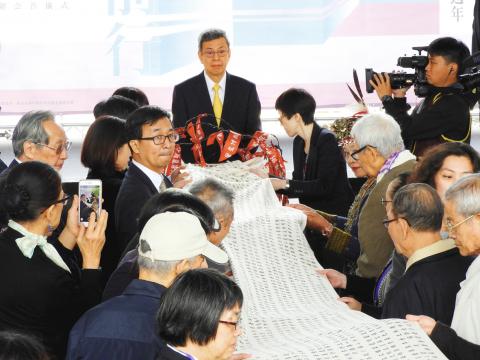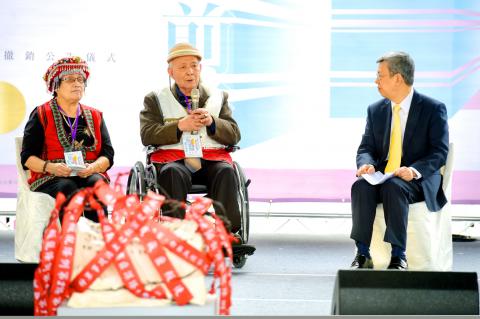A total of 1,505 people who were unjustly convicted during the authoritarian era were yesterday exonerated in a traditional Atayal ritual attended by Vice President Chen Chien-jen (陳建仁).
Of the people exonerated, 27 were Aborigines who were unjustly tried in the aftermath of the 228 Incident or during the White Terror era, Chen said at the event held in New Taipei City’s Jingmei Human Rights Memorial and Cultural Park.
Many of them were very young when they were convicted and some were executed, he said, adding that it was deeply humiliating and traumatic for the victims and their families.

Photo: Chen Yu-fu, Taipei Times
Although many of the exonerated people have passed away, the government still has to ensure that the guilty verdicts from the unjust trials are revoked, Chen said.
Taiwan should be a nation of justice and integrity, and the government must tackle the history of injustice head-on, he added.
The event coincided with the 70th anniversary of the Universal Declaration of Human Rights, making it even more significant, Chen said.

Photo: Huang Yao-cheng, Taipei Times
Promoting transitional justice demands not only exonerating the victims of political persecution, but also restoring historical truth clarifying responsibilities and promoting human rights education, he said.
To realize transitional justice, the government has established the Transitional Justice Commission, passed the Act on Promoting Transitional Justice (促進轉型正義條例) and built human rights museums, Chen said, adding that it would also clarify responsibilities for human rights violations.
Taiwan must learn from its past and improve its human rights record, as well as laws and education, he said, adding that he hopes Taiwan can become “a beacon of human rights in Asia.”
A Sbalay ritual was held at the event, with Atayal Watan Tanaga singing a traditional song in the Atayal language and blessing the attendants.
The ritual could be understood as the pursuit of truth, which is similar to the government’s goal of achieving transitional justice, the commission said.
Reconciliation cannot be achieved by offering a one-time apology, but rather requires a process of sophisticated negotiations and meaningful dialogue, it added.
Novelist Yang Kui (楊逵), best known for his work The Newspaper Man (新聞配達夫) — which was first written in Japanese — was among the people exonerated.
Yang was imprisoned for 12 years for publishing “The Declaration of Peace” in 1949, in which he called for freedom of speech and urged the government to release political prisoners.
Although Yang passed away in 1985 at the age of 79, his granddaughter, acting commission chairperson Yang Tsui (楊翠), said that his exoneration means a lot to her family, especially her parents.
They can “now make peace with themselves,” Yang Tsui said, adding that Yang Kui’s five children, some of whom are in their 80s, have been haunted by their experiences during the White Terror era.
The commission, established in May, on Oct. 5 exonerated 1,207 people who had been unjustly convicted.
Over the next four months, the commission is to exonerate about 10,000 more victims of political persecution.
Additional reporting by CNA

The US government has signed defense cooperation agreements with Japan and the Philippines to boost the deterrence capabilities of countries in the first island chain, a report by the National Security Bureau (NSB) showed. The main countries on the first island chain include the two nations and Taiwan. The bureau is to present the report at a meeting of the legislature’s Foreign Affairs and National Defense Committee tomorrow. The US military has deployed Typhon missile systems to Japan’s Yamaguchi Prefecture and Zambales province in the Philippines during their joint military exercises. It has also installed NMESIS anti-ship systems in Japan’s Okinawa

TRAGEDY STRIKES TAIPEI: The suspect died after falling off a building after he threw smoke grenades into Taipei Main Station and went on a killing spree in Zhongshan A 27-year-old suspect allegedly threw smoke grenades in Taipei Main Station and then proceeded to Zhongshan MRT Station in a random killing spree that resulted in the death of the suspect and two other civilians, and seven injured, including one in critical condition, as of press time last night. The suspect, identified as a man surnamed Chang Wen (張文), allegedly began the attack at Taipei Main Station, the Taipei Fire Department said, adding that it received a report at 5:24pm that smoke grenades had been thrown in the station. One man in his 50s was rushed to hospital after a cardiac arrest

PUBLIC SAFETY: The premier said that security would be tightened in transport hubs, while President Lai commended the public for their bravery The government is to deploy more police, including rapid response units, in crowded public areas to ensure a swift response to any threats, President William Lai (賴清德) said yesterday after a knife attack killed three people and injured 11 in Taipei the previous day. Lai made the remarks following a briefing by the National Police Agency on the progress of the investigation, saying that the attack underscored the importance of cooperation in public security between the central and local governments. The attack unfolded in the early evening on Friday around Taipei Main Station’s M7 exit and later near the Taipei MRT’s Zhongshan

ON ALERT: Taiwan’s partners would issue warnings if China attempted to use Interpol to target Taiwanese, and the global body has mechanisms to prevent it, an official said China has stationed two to four people specializing in Taiwan affairs at its embassies in several democratic countries to monitor and harass Taiwanese, actions that the host nations would not tolerate, National Security Bureau (NSB) Director-General Tsai Ming-yen (蔡明彥) said yesterday. Tsai made the comments at a meeting of the legislature’s Foreign Affairs and National Defense Committee, which asked him and Minister of National Defense Wellington Koo (顧立雄) to report on potential conflicts in the Taiwan Strait and military preparedness. Democratic Progressive Party (DPP) Legislator Michelle Lin (林楚茵) expressed concern that Beijing has posted personnel from China’s Taiwan Affairs Office to its